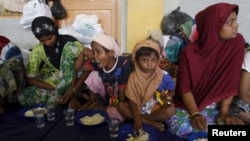The police chiefs of Thailand and Malaysia will hold talks on holding back a tide of migrants landing on their shores,officials said, as a leading organization warned that about 7,000 people were still adrift in the Bay of Bengal.
The United Nations appealed to governments of Southeast Asian nations not to push back the boats, many of them packed with hungry and sick refugees, that have been abandoned by smugglers following a crackdown by Thailand.
"We can foresee a humanitarian emergency happening here," International Organization for Migration (IOM) spokesman Leonard Doyle said at a joint briefing with the U.N. High Commissioner for Refugees in Geneva.
There has been a surge in migrants from impoverished Bangladesh and Myanmar to Malaysia and Indonesia this year following a clampdown on traffickers by Thailand, usually the first destination in the region's people-smuggling network.
Many of the arrivals are Rohingya, a stateless Muslim minority from Myanmar described by the United Nations as one of the most persecuted minorities in the world.
Thailand said on Tuesday it would ask its neighbor for help to track down human traffickers who have slipped across their jungle-cloaked border into Malaysia.
At annual talks between police officials from the two countries, a Malaysian police officer said that his country had already moved more security personnel to the frontier to stem the tide of people trying to cross, but he gave no details of
what coordinated action there may be between the two countries.
Malaysia, one of Southeast Asia's wealthier economies, has long been a magnet for illegal immigrants, but the sudden surge has presented the authorities there with a pressing problem of what to do with them.
Three boats carrying more than 1,000 people landed on the Malaysian holiday island of Langkawi, close to the Thai border, at the weekend.
A senior maritime official said anymore boats trying to land would be turned back. "We don't allow them in," said First Admiral Tan Kok Kwee, northern region head of the Malaysian Maritime Enforcement Agency. "It's a policy matter."
Thousand still at sea
An estimated 25,000 Bangladeshis and Rohingya Muslims from Myanmar boarded rickety smugglers' boats in the first three months of this year, twice as many in the same period of 2014, the U.N. refugee agency UNHCR has said.
Most landed in Thailand, where they were held by the smugglers in squalid jungle camps until relatives pay a ransom.
Thai Prime Minister Prayuth Chan-ocha ordered a clean-up of suspected traffickers' camps last week after 33 bodies, believed to be of migrants from Myanmar and Bangladesh, were found in shallow graves in the south, near the Malaysian border.
That has led to many migrants being left out at sea. "Up to 8,000 people are at sea, of which more than 1,000 have landed," regional IOM spokesman Joe Lowry said.
"We believe there are no more departures from the Bay of Bengal because of a crackdown by Thai authorities but those who are still at sea have been there for weeks or even months."
The UNHCR estimates that around 300 people died at sea in the first quarter of this year as a result of starvation, dehydration and abuse by boat crews. Others have died in camps run by the smugglers.
'If we asked for water, we were beaten'
On Sunday, nearly 600 migrants thought to be Rohingya refugees and Bangladeshis were rescued from at least two overcrowded wooden boats stranded off Indonesia's Aceh province, believing they had landed in Malaysia, authorities said.
The boats were towed to shore by fishermen after running out of fuel. Among those aboard were nearly 100 women and dozens of children.
Muhammad Husein, one of those who landed in Indonesia, said he and about 80 people from the Rohingya community left Myanmar on five small boats and came near Thai shores after two months at sea.
"As soon as we got close to Thailand we got arrested," he said. "I don't know if the people who arrested us were navy officials or sea patrols or traffickers. They were not wearing uniforms but they had guns."
Husein said the migrants were kept confined in the boats for the next 20 days and given only small amounts of food and water. "We could see the land, we could see hills, but they would not let us off the boat," he said. "Many of us cried constantly but if we asked for water, we were beaten. They even beat the women."
Last week, he said, his group and many other migrants were transferred to a bigger vessel and left adrift on the high seas. In Bangladesh, where the authorities are trying to stamp out the crisis at its source, police say they have arrested more than 100 people traffickers in recent months.
Police said a suspected trafficker was killed in a gunfight with police close to the Myanmar border on Tuesday. Three others were arrested and found to be carrying dozens of fake passports.
